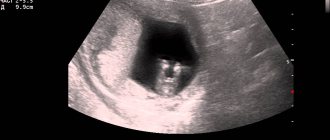Pregnancy is a mystery. Pregnancy is a miracle. Pregnancy is...sometimes a very exciting and stressful period in a woman’s life. Yes, modern future parents now have opportunities that could only be dreamed of 20 years ago. All kinds of genetic screenings, expensive tests and, most importantly, careful monitoring using ultrasound studies. This is a huge plus and progress in obstetrics and gynecology, if you look back at the recent management of pregnancy almost “blindly”.
What is ultrasound examination? And is it so important and informative that practically no doctor can do without it?
What is ultrasound
Ultrasound (ultrasound examination) is a study of the human body using ultrasonic waves, that is, without surgical intervention. This diagnosis is one of the most important in medicine. And although the first memories of it date back to the second half of the 19th century - the beginning of the 20th century, it began to be used in obstetrics about 40 years ago. In perinatal diagnosis even later - in the late 80s - early 90s.
Interestingly, the original and main purpose of ultrasound in obstetrics was to diagnose multiple pregnancies. Only later, already in 1976, the work of ultrasound research was aimed at identifying pathologies of intrauterine development.
How does this happen? Ultrasound passes through the boundaries between organs and tissues and is reflected from them in a certain way. These changes are recorded by a special sensor and translated into a graphic image, which is recorded on the monitor.
The procedure itself is simple, accessible and has no contraindications. That is why it is possible to carry it out repeatedly over several years, months, weeks and even a day, depending on the clinical situation.
Debunking myths
In order not to be afraid and not to test the patience of the attending physician, every pregnant woman should understand where the truth is and where the fiction is. Therefore, it is worth understanding all the nuances of ultrasound diagnostics of the fetus and finding out whether ultrasound is harmful to the developing organism.
Poorly affects prenatal development
As a result of studies conducted to identify long-term effects of ultrasound on fetal development, not a single fact was found confirming its harmfulness. It is worth saying that the benefit has also not been established. Based on these data, it can be argued that following the prescriptions of an obstetrician cannot harm the course of pregnancy.
Does DNA change?
Garyaev’s hypothesis that ultrasound can affect the structure of DNA and lead to its mutation was not confirmed by various studies on white mice. It was established that after half an hour of exposure to ultrasonic waves on pregnant mice, DNA mutations did not occur. Similar experiments on pregnant women were not carried out for ethical reasons.
Therefore, it is difficult to say how harmful ultrasound is during pregnancy. Scientists claim that when passing through the tissues of the body, the signal can cause mechanical vibrations, therefore, manipulation should not be performed at a time when organs and tissues are being laid down.
This is unnatural
As they say, how many people, so many opinions. Each person may have their own view of health safety. Supporters of naturalness and closeness to nature have a negative attitude towards any effects on the body. Any pregnant woman can agree or refuse an ultrasound.
The effect of ultrasound on pregnancy
The excitement of the expectant mother, who was given a referral for an ultrasound, is understandable. The maternal instinct is already working in full force and any “intervention” that concerns the baby causes fear and anxiety. Save, protect, protect... But sometimes you need to help and save. If the pregnancy proceeds without complaints or discomfort, the obstetrician prescribes two main screenings:
- At 12-14 weeks.
- 20-22 weeks.
- The third screening is at 30-32 weeks, carried out according to the doctor’s indications.
But! This is if the pregnancy is progressing normally. In case of unforeseen complications, ultrasound examination can be performed as many times as necessary to monitor the viability of the fetus.
And it makes no difference whether a pregnant woman had only two main ultrasounds, ten, or not at all. There are no precise data or laboratory studies that would confirm the detrimental effect of ultrasound diagnostics on the course of pregnancy. To prevent danger for the baby and help him in utero - yes. But no cases of harm were recorded. Therefore, the anxiety and fear of expectant parents is largely misplaced.
The effect of ultrasound on the fetus
If ultrasound does not affect the course of pregnancy, then is it so harmless for the unborn baby?
It should be remembered that an ultrasound is not an x-ray. And ultrasonic waves are not x-rays. Ultrasound diagnostics, even of the highest power, is accompanied only by local heating of body cells. And this process in the scientific literature has never yet been accompanied by further identification of fetal anomalies.
But often, during an appointment, an obstetrician-gynecologist will advise his “pregnant ward” not to go for an ultrasound without indications and direction. Especially when it comes to the early stages. There are hypotheses (although not confirmed by laboratory studies) that early intervention in the form of ultrasound examination can lead to changes in the structure of the DNA of the embryo, developmental abnormalities, cancer in the future, and even provoke a miscarriage.
There is no official confirmation of these hypotheses. Exactly the same as refutations. But each organism is individual and even the most harmless procedure can sometimes cause unforeseen consequences. No one is immune from this, but strict adherence to the doctor’s recommendations and testimony will reduce the likelihood of a threat to the health of the baby and his mother.
Why do ultrasound diagnostics need to be done?
Scientists have proven that there is no harm from ultrasound during pregnancy. At the same time, this study can confirm or exclude a wide range of pathologies.
Indications for the procedure:
- establishing the fact of pregnancy and determining its obstetric period;
- fetal screening diagnostics (determining the number of embryos and placentation site, identifying anomalies, assessing presentation, position, calculating weight and establishing the expected date of birth);
- the pregnant woman has a history of severe somatic pathology (diabetes mellitus, hypertension, chronic glomerulonephritis or pyelonephritis, etc.);
- in vitro fertilization and/or ICSI;
- a history of spontaneous miscarriages, threatened miscarriage or ectopic pregnancy;
- the appearance of specific complaints of severe pain in the lower abdomen, bleeding from the genital tract, etc.
Is an ultrasound necessary during pregnancy?
Having heard about even the slightest danger of ultrasound examination for the fetus, a pregnant woman may refuse this procedure altogether. This is her right, but the obstetrician-gynecologist will most likely disagree with her.
The first two screenings are mandatory and contain the main information about the unborn child:
- 12-14 weeks - carried out mainly to exclude Down syndrome or other chromosomal pathology. The complex also includes tests for certain markers.
- 20-24 weeks - the size of the fetus already makes it possible to evaluate in detail its anatomical structure for the presence or absence of defects.
The third direction for ultrasound depends on the well-being of the expectant mother, the course of pregnancy and the results of the first two studies.
If a pregnant woman is not worried about anything, especially curiosity, she can easily get by with two trips to the ultrasound room. However, it should not be ignored. Modern medicine gives us such a chance to see our baby even before birth and, in case of danger, to help him. So why not take advantage of this?
Myths and truth about the dangers of ultrasound during pregnancy
Since future parents are not provided with reliable and official information about the dangers and safety of ultrasound diagnostics (due to the lack of this information), all sorts of rumors, “true” stories, fears begin to spread among them - in other words, myths about the dangers of ultrasound during pregnancy. Should they be debunked or are some of them actually valid? Let's see.
- MYTH No. 1. Ultrasound negatively affects the course of pregnancy and harms the fetus. There is no information to confirm or refute this. If the examinations are carried out according to the doctor’s indications and are not too frequent, there is no question of harm. An exception is ultrasound diagnostics in very early stages of pregnancy. And the reason is not the harmfulness of ultrasound, but the immaturity of the embryo’s organs, which are at the stage of formation.
- MYTH No. 2. The child experiences discomfort during an ultrasound examination. The baby is reliably protected by amniotic fluid, so he cannot suffer from ultrasonic waves - he simply does not feel them. Its activity is quite explainable by the mother’s excitement, a full bladder (which is a prerequisite when undergoing an ultrasound) and the touch of the sensor. But not painful sensations.
- MYTH No. 3. You should drink coffee before the examination. The baby's activity depends on the mother's posture - whether it is comfortable for him or not. In addition, the baby in the stomach moves almost constantly, but the mother only feels strong movements. The weaker ones are seen on ultrasound.
- MYTH No. 4. Ultrasound is unnatural. This is a subjective opinion and applies to everyone individually.
- MYTH No. 5. During an ultrasound, a child hears sound and sees light. The fact that during the examination the baby closes his eyes and ears with his hands, tugs at the umbilical cord and turns away does not mean that something is bothering him. He does this all the time. A child is playing, there are no other toys there.
What do the experts say?
Their opinion is categorical: ultrasound radiation can and should be performed, as it solves many problems associated with pregnancy.
Multiple studies have proven the safety of the “3-times” procedure. But there is no need to overdo it with its use. If absolutely necessary, it is permissible to carry out an additional 1-2 diagnostic procedures, but no more. Ultrasound is a technique that gives the most accurate and truthful results, so it is wrong to dispute the need for it.
An ultrasound performed 5-6 weeks before birth allows one to identify delays in the baby’s development and promptly complete a course of supportive therapy and eliminate pathological abnormalities.
Each expectant mother must independently determine whether it is harmful or not to conduct an ultrasound during pregnancy. You should not listen to the opinions of the authors of glossy magazines; it is better to completely trust medical specialists who have education and considerable experience behind them. Today, ultrasound examination is an opportunity to increase the likelihood of having a healthy baby.
In what cases is it necessary to perform an ultrasound during pregnancy?
In addition to mandatory examinations, the expectant mother may be referred by her obstetrician for an unscheduled ultrasound examination. The reason for this will be the well-being of the pregnant woman. If she is worried about abdominal pain, spotting, constant increased activity of the baby or, conversely, the lack of his movements, this is a reason for concern and play it safe with the help of an ultrasound.
But sometimes a pregnant woman feels well, and comments appear at the doctor’s office. For example, the size of the uterus does not correspond to the duration of pregnancy, there is a suspicion that the child is lying incorrectly, or tests are far from normal. In any of these cases, additional ultrasound will be necessary. First of all, for the baby. After all, if he is in danger, help will need to be provided immediately. And to do this, you need to find out the cause and eliminate it.
Is it worth doing an ultrasound in early pregnancy?
Ultrasound in early pregnancy involves examination up to 12 obstetric weeks. It has already been mentioned that 12-14 weeks is the time for the first screening. Why perform an ultrasound earlier than this period? After all, the fetus is not yet formed, therefore, such an examination will not be informative.
But! This is if you are already 100% sure that you are really pregnant. And if not? Then, at 5-7 weeks of the expected period, you can do an ultrasound to exclude ectopic pregnancy and the correct location of the fertilized egg (the fetal sac with a diameter of 2-3 mm can be seen already at 4 weeks and 3 days using a vaginal sensor). And at 8-9 weeks you will hear the cherished heartbeat. More frequent monitoring is determined by the condition of the pregnant woman and the first ultrasound. After all, for example, such a diagnosis as placental abruption requires constant monitoring. Then the harm from the ultrasound itself at such an early stage fades into the background.
The nature of ultrasound and how often it can be done
It is known that X-rays cannot be taken during pregnancy. Some patients, without really understanding it, came to the conclusion that any diagnosis could be harmful. It is not right. X-ray and ultrasound are fundamentally different techniques. If in the first case, minimal irradiation actually occurs, then in the second, the study is performed using ordinary high-frequency sound waves.
Ultrasound waves are located in a range inaudible to the human ear, but at the same time have the ability to penetrate tissue. Ultrasound reaches the structures of the embryo and is reflected from them with varying degrees of intensity, which leads to the formation of a picture on the screen of the device.
Due to the different densities of tissues and organs, the image is clear and informative. The structure of all structures of the embryo, as well as the uterus and placenta, is assessed.
In our country, the rules for the management of pregnancy by obstetricians are legally established. During normal pregnancy, a woman should be examined with ultrasound at least three times. The question of whether ultrasound is harmful or not is still open.
Each additional ultrasound scan must be justified and prescribed by the attending physician. You should not make a decision on an extraordinary ultrasound examination on your own, since numerous scientific hypotheses indicate a possible negative impact on the formation of the fetal brain.
Indications
These are so-called screenings at the 12th, 22nd and 32nd weeks of intrauterine development. The main task of such ultrasounds is to identify any threatening developmental disorders of the unborn child.
The 1st ultrasound confirms the presence of intrauterine pregnancy, determines the gestational age of the embryo, and reveals gross disturbances in the development of the unborn child.
The 2nd ultrasound is performed more closely, because by this time the organs and systems of the fetus are formed, the placenta is functioning at full capacity. When conducting an ultrasound scan, the correct formation of internal organs, the nervous system, and the functioning of the heart is assessed, and almost any congenital pathology is detected. This period of intrauterine development is very important in identifying chromosomal abnormalities. The structure of the uterus, placenta and the amount of amniotic fluid are also examined. In most cases, at 20-22 weeks it is already possible to determine the gender of the unborn baby.
The 3rd ultrasound is the final one in the normal course of pregnancy. The preliminary weight of the fetus is calculated, its position in the uterine cavity, the degree of maturity of the placenta, and the structure of the baby are determined. Very often, future parents can see the face of their child, since modern devices are capable of such an effect. If you wish, you can get the first photo of your child.
The effect of ultrasound on the fetus
Scientists have been researching the effects of ultrasound for decades. There are many hypotheses that claim that the effect of ultrasound on a developing pregnancy is negative.
- When exposed to an ultrasonic wave, tissues and organs at the site where the sensor is applied heat up by several degrees. Embryonic tissues are often subjected to similar heating. A local increase in temperature causes an increase in the permeability of cell membranes, which is accompanied by the possible penetration of substances of various natures into the cell.
- There is an opinion among scientists that when ultrasound is applied many times, this leads to the formation of tumors. No results were provided to support this hypothesis. There are only refuting results from experiments conducted on mice.
- It is assumed that ultrasound has a harmful effect on the development of organs and tissues in humans in the early stages of pregnancy. It is in the period up to 12 weeks that the formation of the unborn child occurs, so it is extremely undesirable to carry out an ultrasound examination during this period of time.
- Sonologists talk about changes in the course of enzymatic reactions in the embryo’s body during ultrasound scanning. These changes may have long-term consequences for the child.
- There are a number of theoretical scientists who claim that exposure to ultrasound causes chromosomal mutations in the fetus. To date, this idea has not been confirmed, and scientists have differing opinions on this matter.
- The opinion of most pundits is that focused ultrasound is the most dangerous. The use of this technique for a long time can cause various disorders in the fetus. It is recommended to use gentle modes and observe the temporary mode of exposure of the sensor to the unborn child.
- Most scientists agree that the fetal brain is subject to the greatest damaging effects, since it contains a considerable amount of water. In addition, it is the most blood-supplied organ, containing only nerve cells. In this regard, American psychiatrists associate the growth of patients with autism with frequent ultrasound examinations of the baby.
- The effect on the brain, according to some scientists, has led to an increase in left-handed children. The danger of ultrasound in this situation is associated with the possible underdevelopment of certain brain functions. There is also a “danger” for a child to become a genius.
Is it worth doing an ultrasound in the second trimester of pregnancy?
The most optimal and safe period for performing an ultrasound examination is 18-22 weeks of pregnancy. This type of ultrasound is also called anatomical. The fruit is already large enough to be assessed for the absence/presence of defects.
If the data from such a study are normal, then the pregnant woman will no longer have to undergo additional ultrasound scans, since there will be no informational benefit from them.
At what time and how many times should ultrasound be performed?
Over the entire nine-month period, 3 diagnostics must be carried out:
- at week 12 - to exclude the presence of chromosomal pathologies and gross maturation defects;
- at week 22 - to study the anatomical structure of each system and organs of the embryo, special attention is paid to the cardiovascular and central nervous systems;
- at 32 weeks - the last examination, which is carried out immediately before birth.
Additionally, at week 18, a woman must undergo biochemical tests, based on the results of which a geneticist will be able to determine the presence of anomalies.
Is it necessary to do an ultrasound in the third trimester of pregnancy?
In a normal pregnancy, there is no need for ultrasound monitoring in the third trimester. The only exception is the period before childbirth, when the doctor needs to know the level of placentation, how the fetus is located, what the approximate size of your baby is and whether there is any entanglement in the umbilical cord.
All this information is very important during childbirth, because the obstetrician must be prepared for anything. It should be noted that sometimes ultrasound does not provide complete information about the baby. It all depends on the equipment and on the professional skills of the ultrasound specialist.
Disputes about the dangers of ultrasound: who is right (arguments against, arguments for)
Suggestions that ultrasound is harmful have appeared quite recently. Since before the benefits of it were so obvious and, to some extent, fantastic, that they didn’t even think about the other side.
Now there are fierce debates in the medical field and beyond: is ultrasound harmful? And how often, in what cases is it appropriate?
Arguments for"
Using ultrasound, careful monitoring of the course of pregnancy and intrauterine development of the child is carried out month by month. Namely:
- The viability of the fetus or its death is determined.
- The exact gestational age and estimated date of birth are given.
- The condition of the placenta and amniotic fluid is assessed.
- A multiple pregnancy is diagnosed. As well as possible congenital developmental pathologies and their severity.
- The baby's growth and weight gain are monitored.
- Contains information about the gender of the child.
Arguments against"
At the end of the working day, specialists who conduct ultrasound examinations feel a headache, severe fatigue and body aches. In the USSR they were even paid extra for the harmfulness of their work. But a 10-minute study cannot be compared to a full day's work. Just as the body of an unborn baby and an adult are not comparable.
Other dangers (such as the likelihood of DNA changes, cancer and developmental disorders) have not been scientifically proven and are often a purely subjective opinion.
Impact of sound waves on cells
There are disputes among specialists about whether ultrasound examination is dangerous and whether it is harmful in early pregnancy. Ultrasonic waves have a thermal and mechanical effect on the cells of the body. Let's consider the thermal and mechanical index.
Thermal index.
Ultrasonic waves, when interacting with tissues, lead to their heating. Naturally, the temperature inside those cells that contain a larger volume of water increases. Such heating can be harmful, especially for the fetus, whose size reaches only millimeters at the time of diagnosis.
Brain cells contain the most water. There is an assumption that it is this tissue that undergoes maximum heating after ultrasound. The consequences of this effect on the development of the embryo were not recorded.
Foreign specialists refer women for ultrasound examination only after 11-12 weeks. Previously, ultrasound was performed only if the patient had complaints. Ultrasound is not recommended for very early pregnancy without strict indications, although no harm has been recorded from it.
Mechanical index.
Ultrasound also has a mechanical effect on fetal tissue, consisting of pressure due to intensive intake. The sound pressure amplitude should not exceed 1.9. During the ultrasound examination, the effect of a sound wave of significant frequency (3.5-5 MHz) on the body is recorded.
Is 3D ultrasound harmful to the fetus?
3D ultrasound is a three-dimensional study that makes it possible to obtain a three-dimensional color image of the fetus as a whole and individual parts of its body. In principle, it is no longer different from a regular ultrasound.
There is an opinion that 3D ultrasonic waves are more powerful and have a negative effect on the baby’s intrauterine development. But, firstly, this has not been proven. Secondly, any ultrasound examination within 30 minutes is safe for the mother and the unborn child. Thirdly, a lot depends on the ultrasound machine itself. The main thing is not to abuse this diagnosis for the sake of curiosity or “just because.”
MYTH #1: Ultrasound has a very bad effect on prenatal development.
There is no refutation or evidence of this . Moreover, conducting research on old devices from the 70s, experts did not reveal any harmful effects on the embryo.
Answer from gynecology and ultrasound specialist D. Zherdev: You should not perform frequent ultrasounds. However, if there is a threat of miscarriage, then, of course, you need to go for an ultrasound. If there are no such indications, then 3 scheduled ultrasounds are sufficient. There is no need to do the study “just like that,” especially in the first trimester. After all, ultrasound is a wave that is repelled from the organs of the embryo, forming a picture for us on the monitor. I am not completely confident in the absolute neutrality of ultrasound. As for the later stages, at which many parents take 3-D photographs as a keepsake, the possible influence of ultrasound on fetal development is unlikely. At this time, the embryonic systems are already formed.
Long-term consequences of ultrasound
Since this kind of research is relatively new in obstetric practice, its long-term consequences are not yet known. In addition, the lack of “purity of the experiment” will prevent them from being determined. Indeed, genetics and environmental influences should also be added to the sources of potential danger to the health and development of a child.
You can debate for a long time on the topic “is ultrasound harmful during pregnancy and does it affect the fetus” and still not come to a common decision. But, if it is accepted, it will most likely be purely subjective. After all, each organism is individual, as is the influence on it. You just have to remember that nothing in medicine is absolutely safe. And if you neglect the recommendations of doctors, the consequences will not keep you waiting.
Indications for research in the 2nd and 3rd trimesters
The woman will need to undergo ultrasound radiation again at 20-24 weeks of pregnancy, that is, in the second trimester.
During the examination, the doctor will be able to:
- determine the condition of the cervix;
- locate the placenta;
- see the presence of any anomalies, including anatomical ones, associated with fetal development;
- assess the condition of the cervical canal.
The manipulation will not only measure the weight of the unborn baby, but also determine its gender. To obtain information, it is necessary for the embryo to take a position convenient for the doctor, only then will he be able to examine sexual characteristics.
Regarding whether ultrasound is harmful or not during pregnancy in the third trimester, doctors unanimously say that it is not.
Without an ultrasound examination, medical specialists will not be able to prepare a woman for the upcoming birth.
Using the procedure, the doctor receives important information:
- assesses the condition of the amniotic fluid;
- the presence of inherited pathologies of the embryo;
- presence of intrauterine infection;
- an indicator of the speed of blood flow in the umbilical cord area.
When the data on the last point is far from normal, the woman may be referred for premature birth. When hypoxia develops, the child simply does not receive enough oxygen, which can be fatal.











